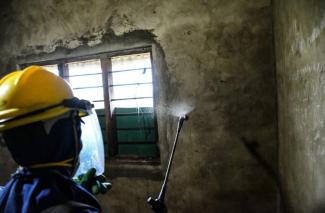Dar es Salaam, Tanzania – This past year, COVID-19 created an unprecedented global crisis. Yet malaria has long been a crisis in Tanzania. The United States is proud to support Tanzania to continue its fight against malaria. The efforts Tanzania has taken to sustain essential malaria services are saving many lives.
The U.S. President’s Malaria Initiative has partnered with Tanzania to fight malaria since 2006, contributing $176 million in the last four years. This funding has delivered insecticide treated bednets, life-saving medicines, high quality diagnostic testing and trained over 4,700 health workers to date. Through close collaboration with the people, institutions and government of Tanzania, the U.S. government also strengthens health systems to reinforce and amplify Tanzania’s efforts to end this deadly, yet entirely preventable, disease. Tanzania’s significant progress against malaria is highlighted in the U.S President’s Malaria Initiative’s 15th Annual Report. For example, ownership of insecticide treated bednets has increased to 78 percent (up from 23 percent in 2005). Sleeping under these treated bed nets physically blocks mosquitoes at night, when they are most likely to bite, and kills mosquitoes that land on them. Thus, reducing the spread of malaria.
During a recent Clouds FM interview to commemorate World Malaria Day, USAID Mission Director Andrew Karas remarked, “PMI investments support and build on those made by the Government of Tanzania. Our support aligns with Tanzania’s priorities outlined in its Vision 2025 by focusing on developing human capital, as well as institutions and systems which the government sees as critical to achieving and sustaining its long-term vision.”
Despite incredible progress, too many people still lack the malaria interventions we know save lives. We must reach the unreached. Too many nurses, midwives, community health workers and others are delivering essential malaria services with insufficient training, equipment, and pay. We must make health systems safer for them and better for the people they serve. The milestone of eliminating malaria is still too far away for many countries. We must strive to end malaria faster.
U.S. Global Malaria Coordinator Raj Panjabi, appointed by President Joe Biden to lead the U.S. President’s Malaria Initiative, says, “Science shows we can beat malaria and we can beat it in our lifetime. Yet we need bold action to stop COVID-19 from holding us back. The United States is proud to partner with Tanzania to continue the fight.”
For more information, please contact the U.S. Embassy Dar es Salaam Press Office at DPO@state.gov.

Alex Larrieux / USAID
